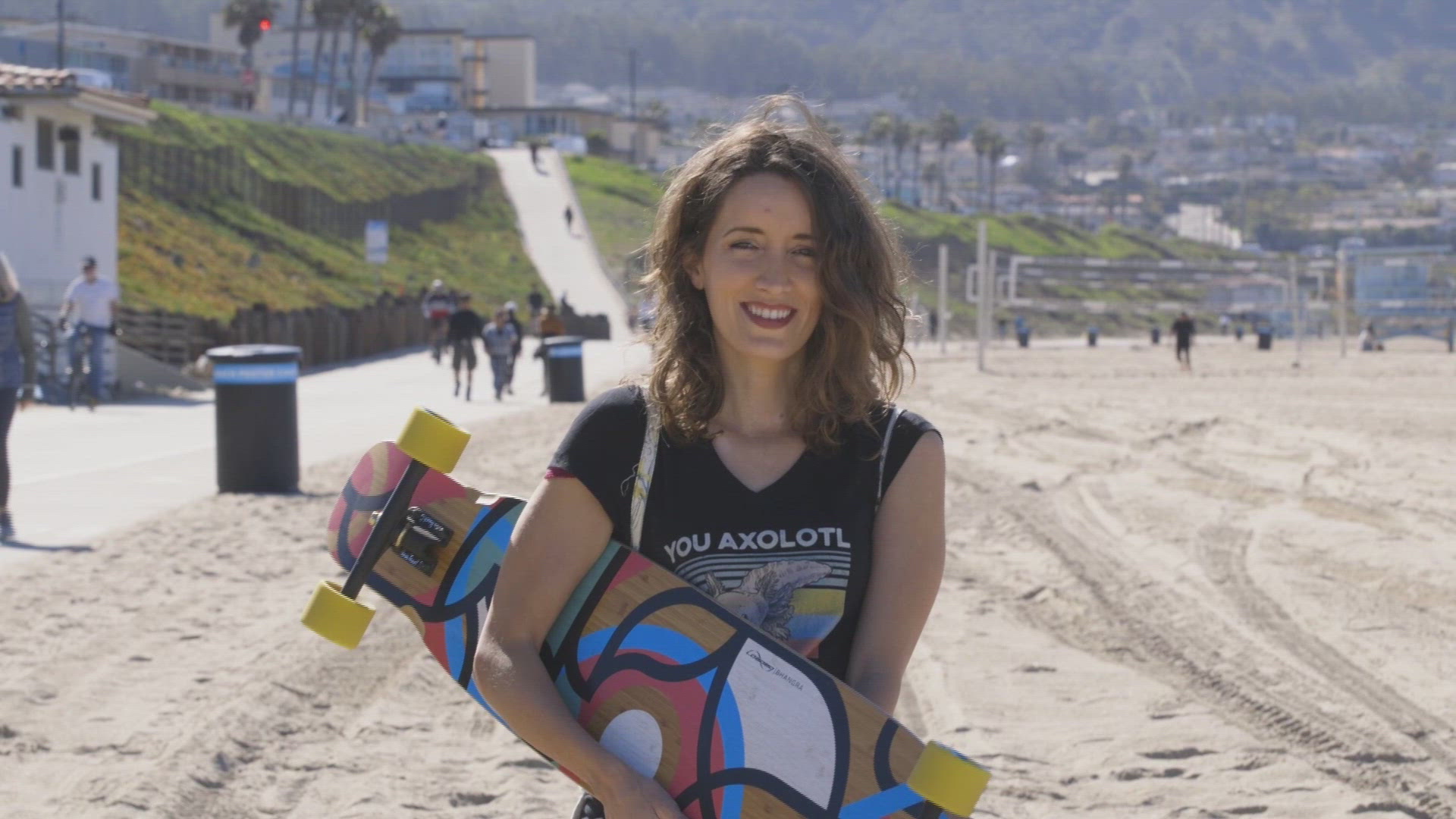How Jean Guerrero Found Joy in Longboard Dancing
By Julia Woock, committee member
Recent events remind us journalists are among the first on the scene to a disaster, often leading to trauma. In fact studies show between 80-100 percent of journalists have faced work-related trauma. Journalists are also a part of the continuous news cycle and it is often easy to get lost in our work, skipping meals and losing sleep in the process.
Jean Guerrero, San Diego native and opinion columnist for the Los Angeles Times, learned to skateboard in spring of 2020. She found joy and way to soothe her pandemic anxiety with longboard dancing, after beach closures in San Diego kept her from surfing.
In a conversation with NAHJ San Diego-Tijuana, Guerrero talks about longboarding and the importance of finding work-life balance.
NAHJ SD-TJ: How did you start skateboarding? Was it something you had done when you were younger, or something you got into when you were older?
JG: Especially during the pandemic, I just felt like I really needed to be in nature. I couldn’t surf, so I was expressing to a friend how anxious I was, and how depressed I was about the state of things. He just completely out of the blue sent me a longboard as a gift. It just showed up outside my house and I opened it up and it was the loaded champion, which is not a dancing board. It’s a longboard, but not as big as the one that I have.
NAHJ SD-TJ: How does skating make you feel?
JG: It’s just incredibly freeing. It feels like the world is so chaotic and outside of our control. When I’m skating, I feel almost like I’m harnessing that chaos and all of the things that are outside of our control and just like channeling it into the act of carving along, and there’s something about it.
NAHJ SD-TJ: Where is your favorite place to skate?
JG: In San Diego, my favorite place is going from South Mission Beach to Pacific Beach on the boardwalk. I think the boardwalks are my favorite place just in general. I love being on the boardwalk. I love being close to the ocean. That’s another part of it, which I wrote about, I just love that feeling of being on the border between the land and the ocean. As somebody who grew up on the border, there’s something about being present at a border, even if it’s not an international border. (Even) a coastal border, it just feels like I belong there. Those in between spaces to me feel like home. That’s kind of what longboarding is, you’re existing in this transitory space.
NAHJ SD-TJ: How important do you feel it is to make time for an activity such as skateboarding, for a person’s mental health or well being?
JG: It’s so important. I feel like it has kept me sane the past couple of years and the positive impact that it’s had on my life has helped me to understand how important balance is in our lives. I feel like I’ve gone through most of my career, just being very ambitious and focused on work, to the detriment of everything else in my life. Whether it’s physical exercise, or friendships or family, like I’ve just always been someone to prioritize work. Even to the point where I don’t eat or sleep sometimes. I’ve been a workaholic in the past. Shortly before the pandemic, my priorities started to shift and and then when I started longboarding, it brought me so much joy that I was like, ‘Oh my God, I didn’t even know this much joy could be possible anymore’. I had forgotten what that joy was like. That childhood joy, where you’re not really thinking about work. I’m always thinking about work and when you do that, you just burn out and you can’t produce. It’s just not a sustainable way to live or to be a journalist where we’re exposed to so much suffering and trauma on a daily basis. We need to take care of ourselves and we need to make space for play and creative expression in a way that brings us joy. For me, that’s what longboarding has enabled me to do.
NAHJ SD-TJ: How do you find time?
JG: You just have to make time. Like I said, you get so wrapped up in this profession, that you can just spend all of your time working, because it does provide a sense of purpose. It’s a pillar of democracy. It’s an important job. So it’s easy to just get sucked into it and, and to just be working all the time. You just have to force yourself to break, and then you realize that once you do force yourself to break that cycle and you force yourself, you create time, even when you feel like there is no time. You realize after a while the world doesn’t collapse. You’ll come back to work, more replenished and able to be more productive. It’s essential to our well being and our humanity, but also has the added benefit of making you a better worker. I wish our work culture was such that these kinds of activities were encouraged and even required, because it would actually make us better. The science shows that makes us better workers and we’re a society that’s obsessed with productivity. If we actually want better, more productive people, then we should give them space to not be productive every now and then.
NAHJ SD-TJ: What advice would you have for people who want to get into skateboarding?
JG: Learning to be okay with having my knees bent (squatting over) on the board, so that my balance is lower to the ground. It’ll make it less likely that you’re gonna fall and it’s just the best way to to to establish balance quickly.
NAHJ SD-TJ: Do you have any board recommendations?
JG: If somebody wants a longboard dance, the board that I bought which really helped me learn the dance steps is called Loaded Bhangra. It really has a lot of space for you to learn all kinds of dance steps. It’s just really stable because it’s long and heavy, but not heavy to the point where you can’t move it around or anything like that.
NAHJ SD-TJ: Is there anything else you would like to share?
JG: As journalists, we’re always unusually aware of how (many) bad people and bad actors there are in the world. It’s easy, I think to I start to despair and to lose hope. But longboarding has helped me to cultivate hope not just because it’s a joyous activity, but because there’s so much community around it and these people are good. They’re nice people. I’m always surprised to meet new and just very different types of people that make me feel accepted.


